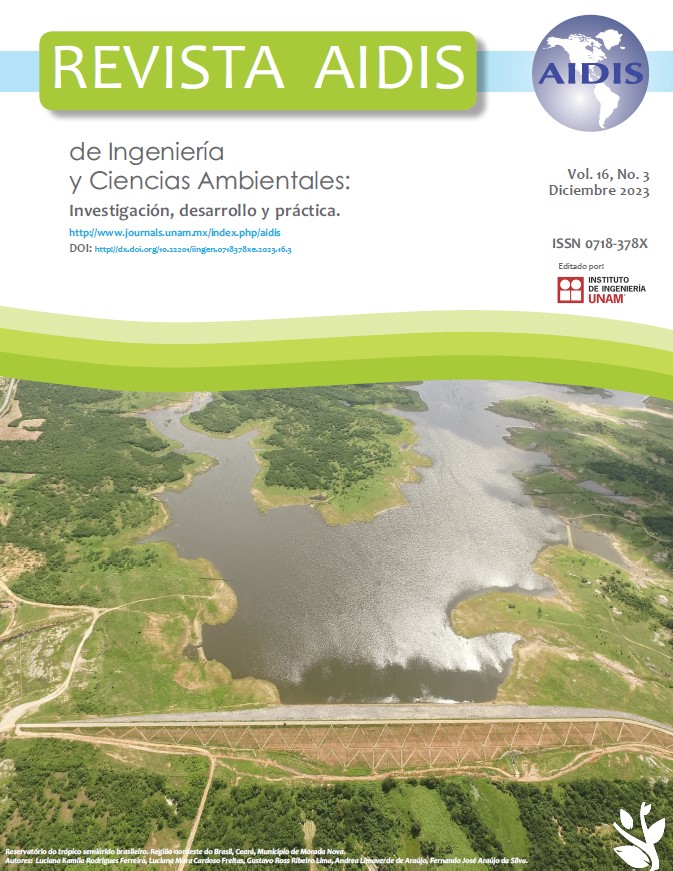ONSITE SANITATION GOVERNANCE TOOLS FOR SMALL MUNICIPALITIES – FIRST STEPS FROM SANTA CATARINA STATE, SOUTH BRAZIL
Contenido principal del artículo
Resumen
Promoting sanitation solutions are more than just choosing the right technology. The need for stakeholders’ cooperation and engagement challenges small municipalities to consider fecal sludge management (FSM) and simplified sewerage approaches, not only conventional systems, promoting a flexible suite of services and emerging governance discussion in this complex scenario. In this paper, we conducted 10 semi-structured key informant interviews (KII) and show 15 implemented governance tools in 5 municipalities with less than 10,000 inhabitants, in Santa Catarina State, in the Brazilian southern region. None of the researched municipalities showed a systematized framework and the governance structure is composed of dispersed tools, mainly developed in response to a public attorney, who acts as a blind sponsor of onsite solutions, calling other stakeholders for action. Onsite sanitation performs a relevant role to achieve service universalization, this paradigm shift requires a new governance structuring model that considers FSM as a part of this ecosystem seems to be the trail first step especially where the conventional approach does not always reach financial sustainability.
Detalles del artículo
Citas en Dimensions Service
Citas
Berendes, D. M., Sumner, T. A., Brown, J. M. (2017) Safely Managed Sanitation for All Means Fecal Sludge Management for at Least 1.8 Billion People in Low and Middle Income Countries. Environmental Science and Technology, 51(5), 3074–3083. https://doi.org/10.1021/acs.est.6b06019
Bhagwan, J. N., Pillay, S., Koné, D. (2019) Sanitation game changing: Paradigm shift from end-of-pipe to off-grid solutions. Water Practice and Technology, 14(3), 497–506. https://doi.org/10.2166/wpt.2019.059
Brazil (2017) Lei Federal nº 9.203/2017 (22 November 2017) Dispõe sobre a política de governança da administração pública federal direta, autárquica e fundacional. Brasília. http://www.planalto.gov.br/ccivil_03/_ato2015-2018/2017/decreto/d9203.htm (acessed on 02 June 2021). In Portuguese.
Brazil (2020) Lei Federal nº 11.445/2007 (5 January 2007) Estabelece as diretrizes nacionais para o saneamento básico. Brasília. http://www.planalto.gov.br/ccivil_03/_ato2007-2010/2007/lei/l11445.htm (acessed on 31 May 2021). In Portuguese.
Brazil (2017) Water National Agency, ANA Atlas Esgotos: despoluição de bacias hidrográficas. http://atlasesgotos.ana.gov.br (accessed 22 March 2022). In Portuguese.
Brazil (2015) Plano Nacional de Saneamento Básico – PLANSAB, mais saúde, qualidade de vida e cidadania. 14 jan. 2015. MDR, Ministério do Desenvolvimento Regional https://www.mdr.gov.br/saneamento/plansab/apresentação (acessed on: 02 jun. 2020). In Portuguese.
Gambrill, M., Gilsdorf, R. J., Kotwal, N. (2020) Citywide Inclusive Sanitation—Business as Unusual: Shifting the Paradigm by Shifting Minds. Frontiers in Environmental Science, 7. https://doi.org/10.3389/fenvs.2019.00201
IBGE (2012) Censo Demográfico 2010. Resultados do Universo – Municípios. IBGE, Rio de Janeiro, 2012. https://ftp.ibge.gov.br/Censos/Censo_Demografico_2010/ (accessed on June 2019). In Portuguese.
Lefevre, F., Lefevre, A.M.C., Marques, M.C.C. (2009) Discourse of the collective subject, complexity and self-organization. Ciência e saúde coletiva, 14(4), 1193–1204. In Portuguese
Lisboa, S.S., Heller, H., Silveira, R.B. (2013) Challenges of municipal planning for basic sanitation in small size municipalities: the managers’ perception. Eng. Sanit. Ambient. 18(4), 341–348. In Portuguese.
Peal, A., Evans, B., Ahilan, S., Ban, R., Blackett, I., Hawkins, P., Schoebitz, L., Scott, L., Sleigh, A., Strande, L., Veses, O. (2020) Estimating Safely Managed Sanitation in Urban Areas; Lessons Learned From a Global Implementation of Excreta-Flow Diagrams. Frontiers in Environmental Science, 8(January), 1–13. https://doi.org/10.3389/fenvs.2020.00001
Rao, K. C., Velidandla, S., Scott, C. L., Drechsel, P. (2020) Business models for fecal sludge management in india. In Resource Recovery and Reuse (Vol. 2020). https://doi.org/10.5337/2020.209
Teixeira, A. F. and Gomes, R. C. (2019). Public governance: a conceptual review. Rev. Serv. Publico 70(4), 519-550. In Portuguese.
WB, WSP (2016) World Fecal Sludge Management: Diagnostics and Guidelines for Service Delivery in Poor Urban Areas Summary Report. World Bank, Washington, DC. ©World Bank.
World Bank Group (2016) Fecal Sludge Management Tools: Data Collection Instruments. World Bank, Washington, DC. © World Bank. https://openknowledge.worldbank.org/handle/10986/25773 (accessed on 5 December 2019)

Esta obra está bajo una licencia internacional Creative Commons Atribución-NoComercial-SinDerivadas 4.0.
